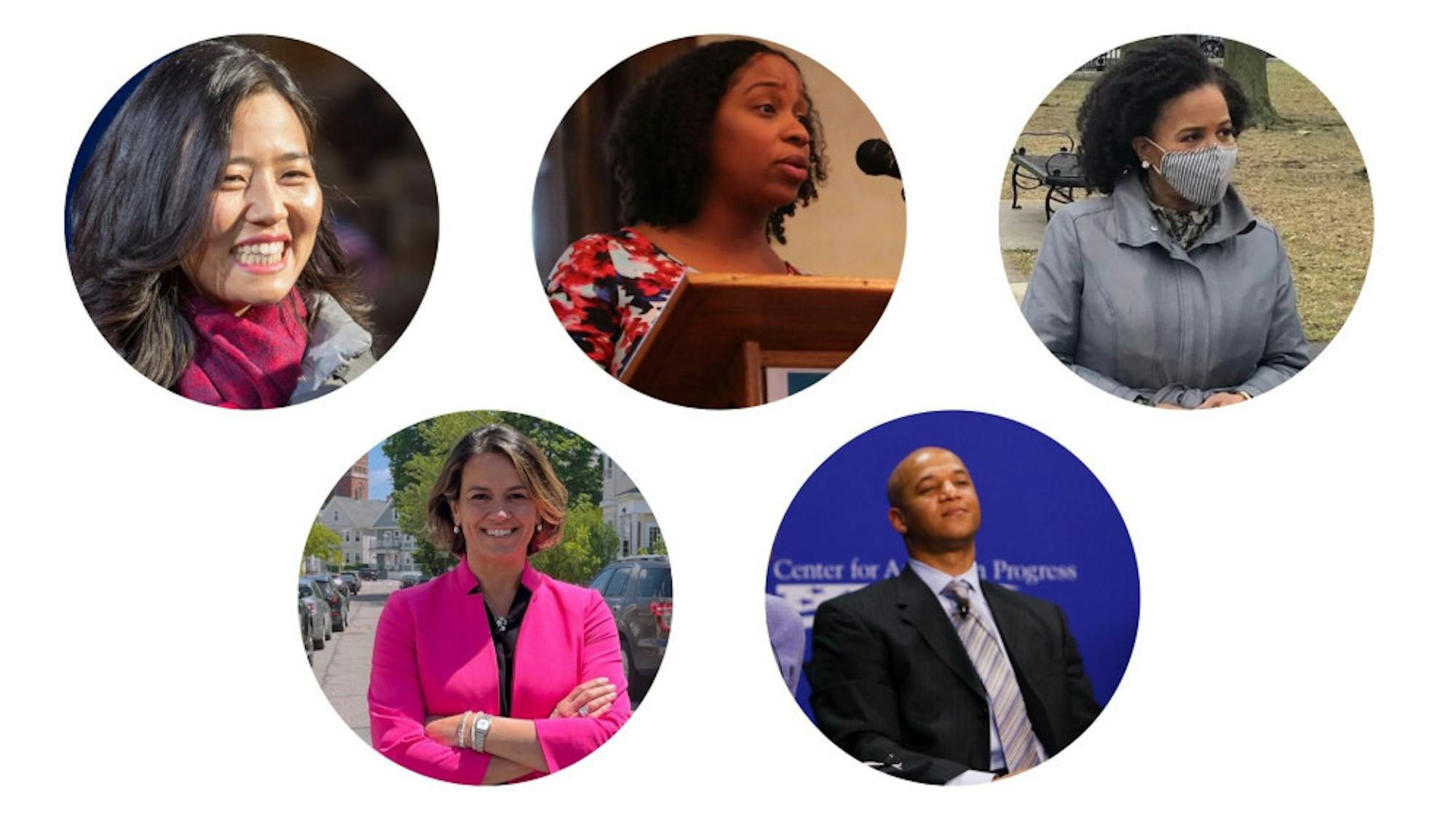The Boston mayoral race will be narrowed from five major candidates to two candidates in a preliminary election on Sept. 14. The election has provided Tufts students with opportunities to get involved in municipal politics and gain experience in grassroots organizing.
Of the five major candidates in the running for mayor, four are currently competitive according to NBC Boston.A Suffolk University/Boston Globe poll taken Sept. 7 indicates that City Councilor Michelle Wu is in the lead, followed by acting Mayor Kim Janey, City Councilor Annissa Essaibi George and City Councilor Andrea Campbell.
“[Wu] has a moderate lead in two most recent polls,” Professor of Political Science Jeffrey Berry said. “Whoever emerges second, assuming Wu finishes first, is going to be in a competitive position.”
Berry said that while incumbents typically have a significant advantage in Boston mayoral elections, Janey has not seen that same incumbent advantage. Janey assumed the role of acting mayor in March when former Mayor Marty Walsh resigned to serve as U.S. Secretary of Labor.
“Based on these polls, she has declined a little bit over the past month or two,” Berry said. “It is a bit surprising that she’s not doing better in the polls.”
When it comes to important issues in Boston city politics, Berry said the cost of living is most likely the biggest thing on many voters’ minds. According to anEmerson/7 News poll taken Aug. 23–24, 19% of Boston voters consider housing to be their top issue.
“A lot of voters are frustrated and would like there to be some change so that paying their rent or a mortgage is more reasonable,” Berry said. “I think they’re also smart enough to recognize that none of the five candidates can really change that significantly. Nevertheless, when we ask people what concerns them, the cost of living and especially the cost of housing is likely to come up on top.”
Education has also been a major topic of the race, according to Berry.
“Education is also a perennial issue in Boston," he said. "Parents are frustrated that schools are not better, and there’s a lot of debate over access since Boston has some competitive admission schools ... Whether or not the voters believe that any one of [the candidates] is actually going to change the school system is unclear, but they are speaking powerfully and extensively about education.”
According to Justin Hong, a campaign and advocacy fellow for the Environmental League of Massachusetts (ELM), Wu has made global warming a key issue in her campaign. ELM, which endorsed Wu, advocates for climate oriented policies at the state and municipal levels.
“[Wu's] plans--such as her proposed citywide Green New Deal--demonstrates an understanding of the intersectionality between climate change and issues like public health, transportation, and housing policy,” Hong, a sophomore, said in an email to the Daily.
Many of the issues being discussed by the candidates have implications for students and residents of nearby communities, driving some students to get involved with campaigns. Violet Kopp, an organizing fellow for Michelle Wu, said that decisions made on issues like transportation and climate change in Boston will have an impact on Tufts students.
“There is a Green Line [Extension] stop coming to campus,” Kopp, a sophomore, said. “Michelle is the transportation candidate, and expanding public transportation is a huge deal. That’s one of those concrete, day-to-day things that are going to be affecting Tufts students.”
Hong also said that Wu’s proposal to make public transportation free would impact his relationship with the city of Boston.
“With free public transit, I would go into the city and travel around the Metro area much more often,” he said.
For Kopp, getting involved with Wu’s campaign was inspired by an endorsement from Massachusetts Senator Elizabeth Warren, whose presidential campaign she had previously worked on.
“When I saw not only that [Warren] had endorsed this mayoral candidate, but that it was a mayoral candidate for a city that I was temporarily living in ... I really wanted to get involved," Kopp said.
According to Kopp, a big challenge for her was becoming familiar with Boston and its many neighborhoods. Most of her work involves coalition building in Hyde Park, including talking to religious and interfaith groups about Wu’s campaign.
“I’m from New York City," shesaid. "The greatest challenge [for me] is that little imposter syndrome of ‘I’ve lived in Medford and Somerville for a year, what do I know?’"
Kopp said that she hopes Tufts students will recognize the power of city politics and get involved.
“I think that a lot of attention is often focused, for good reason, on federal politics, but we have so much more of an opportunity as individuals to make a change if we get involved hyper-locally in our communities," she said. "And you know, what better way to do that than getting involved in a local city race?”
For Hong, the possibility of having more representation among elected officials is exciting.
“On a personal note, the mayoral race is important to me on the issue of representation,” Hong said. “As a fellow Taiwanese American, I am extremely excited about the prospects of having representation in a prominent elected office!”






